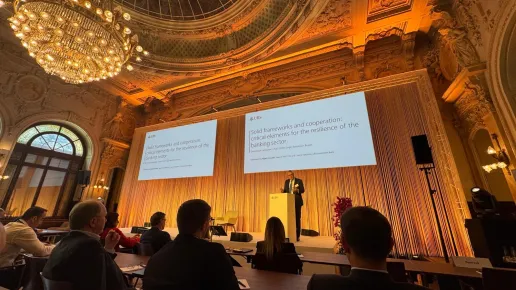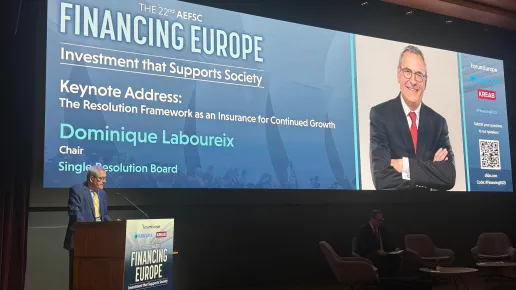[Introduction]
Good morning to each of you connected online and also to those of you gathered here at the SRB premises in Brussels. I want to welcome you, particularly our speakers. Thank you for the interest you are showing in the area of banking resolution in Europe and the legal framework that governs it.
We are all aware of the context in which we meet today, the war in Ukraine, and while I want to acknowledge the tragedy of it, I will stick to the ‘bread and butter’ topics for the SRB in the area of banking resolution.
This is the first such legal conference held by the SRB, and there are very important topics on the agenda such as cooperation, the role of administrative review bodies and the exercise of administrative discretion.
I have about 14 minutes left and in that time I want to:
- First of all, remind you of the role of the SRB and where we fit in the resolution framework in Europe;
- Secondly, I will take a look at our recent Sberbank case;
- Finally, I will be taking a look at some areas where there is room for improvement in the resolution framework, from our viewpoint at least.
I am also interested to hear your ideas from the experiences in the US, the UK and of course here in Europe in the various panels.
[1. About the SRB and the EU resolution framework so far]
To my first point – a word about the SRB itself. We are an independent, self-financed agency of the EU and we were set up as part of the Single Resolution Mechanism, or SRM, which is one of the three pillars of the Banking Union. We have been operating since 2015, and the main planks of the EU legal framework are the SRMR and BRRD.
As a refresher, the first pillar of the Banking Union is the Single Supervisory Mechanism, or SSM, the second being ourselves as part of the SRM, and the third and final pillar is a common deposit guarantee scheme, also known as EDIS – unfortunately not yet in place.
Coming back to the second pillar, the SRM and the work of the SRB now; our mission is to protect taxpayers’ money from any future bailouts and promote and maintain financial stability. We do this by working with each bank to make it resolvable. As our experience has shown, the better a bank is prepared for resolution, the less likely it is that it will go into resolution.
The SRB is responsible for resolution planning, together with the National Resolution Authorities or NRAs, for around 120 major banking groups in the 21 countries that make up the Banking Union. And it is clear that we are moving from drafting the relevant policies and plans, to the assessment phase. We are now assessing the soundness of resolvability through testing and ‘dry-runs’, as well as quality control to achieve consistency. As stated before, all SRB banks need to be resolvable by 2024. We will publish the first assessment of resolvability, , this summer, to be followed hopefully by annual updates.
Our goal is to protect financial stability without using public money – in other words bail-in not bail-out.
So, that is a quick summary of where the SRB fits into the Banking Union’s landscape. In our short existence, we have built-up real-world experience as to how the resolution framework works in Europe and beyond. With this in mind, I move to my second point this morning, which is on the case of Sberbank.
[2. The Sberbank experience]
The case of Sberbank allowed us to test the legal provisions in a real-life situation. The crisis in this case unfolded with great speed because of the current geo-political situation and resulting loss of trust in this specific bank, so a classic run on this bank.
This was a small, but truly cross-border, bank. We had decisions to make in three countries – Croatia, Slovenia and Austria. First, a 48-hour moratorium was deemed necessary for the group when the bank was assessed as failing or likely to fail. In Croatia and Slovenia, we decided that resolution was in the public interest and, within the moratorium period, buyers for the two subsidiaries in these countries could be found in an open sales process. In these two countries, operations of these banks continued on as normal, with no impact on customers or on financial stability.
Turning to Austria, we decided that no resolution action was required for the Austrian parent company, because it was not in the public interest, and therefore it is now being dealt with at national level in Austria. In other words, the bank has ceased operations and depositors are protected under the national deposit guarantee scheme.
We were able to manage the crisis, thanks to the structures in place. We worked hand in glove with many partners at national, EU and international level and I am thankful for the excellent cooperation we received at all these levels. This was of particular importance in this case as Sberbank Austria:
- had subsidiaries in the Banking Union;
- had subsidiaries outside the Banking Union but in the EU;
- and finally, had subsidiaries outside the EU.
All the actions taken were well coordinated by the SRB, thanks, as I said, to the good cooperation from our partners in many countries. As you can imagine, the legal complexities of operating across so many jurisdictions was a challenge, and this case, though small, is a strong reminder not to underestimate the need for coordination and cooperation.
The three decisions taken had one thing in common – protection.
The decisions protect financial stability.
The decisions protect depositors up to an amount of at least 100,000 euro in Austria and with no limits in both Slovenia and Croatia.
And all this was achieved while protecting the taxpayer – no public funds were used.
The case of Sberbank is further proof that the EU’s resolution framework works - but let us bear in mind that Sberbank was not a large EU bank by any stretch of the imagination. This takes me to my third and final point this morning: possible areas for improvement in the resolution framework.
[3. Room for improvement]
In Sberbank, we were – again – faced with some problematic points, which call for prompt and balanced solutions:
- The moratorium was important in this case, but even so, timing is an issue if we are to allow every party, the time they are legally entitled to, for examination of the various steps of the scheme. Adding the SRF and the backstop in a resolution case would mean even more time pressure, so really this is something that could be looked at. If you add all the consultation phases, you need easily much more time than just the weekend.
- In the Sberbank group, we were dealing with different legal frameworks simultaneously, creating quite some challenges. It is important to highlight that this would be amplified for a larger banking group operating in say half a dozen or more Banking Union countries and beyond. This is why I have long been calling for a harmonisation of the framework for insolvency of financial institutions. Harmonisation is really important if we are serious about being able to resolve large banks over just a few days, let alone have a sound NCWO assessment. This case should serve as reminder of the need to get on with the job of harmonisation, not least to enable the consistent management of bank failures within the Banking Union or, better still, right across the EU. Let’s hope the CMDI review delivers this.
- The third point I would highlight is the need for a European Deposit Insurance Scheme or EDIS. Customers of these banks needed to be assured that their savings or deposits, are protected up to 100,000 euro. It would be much better to have a European guarantee scheme to provide reassurance to depositors. It is important we can communicate with confidence in a time of crisis. At present, the set-up is not yet optimal. We have to ask the question, what happens if the DGS is not sufficiently funded to pay out? Would the taxpayer be on the hook for the balance? Therefore, I hold much hope for the European Commission’s Crisis Management Deposit Insurance review and the upcoming Council discussions. I hope progress can be made on some aspects as soon as possible. I know that the Eurogroup president Paschal Donohoe is trying his utmost to progress this topic.
- Perhaps just a last point: there is a need for further consideration on the practical aspects of the implementation of the Single Point of Entry strategies, including identification of the legal and practical obstacles to the transferability of funds from the point of entry to the subsidiaries. We have to ensure that a bank operating across a number of countries with a Single Point of Entry resolution strategy, will really be resolved as a group and that there are appropriate arrangements that ensure the resolution entity will “take care” of a subsidiary located in a different jurisdiction in the event of a crisis. We saw in the Sberbank case how challenging managing the failure of a bank operating across jurisdictions can be and, as I said, that was only a relatively small bank in Europe!
[Conclusion]
Ladies and gentlemen, fellow speakers, I am coming to a close, since I know there is a huge variety of interesting points of view to be put forward today and I am keen to let them be heard too.
Thank you for your time, either as a speaker or as part of the audience, and thank you in particular to those who have prepared today’s conference, and especially the team led by our General Counsel here at the SRB. As I said earlier, it is important and valuable to be able to take a step back, gain a different perspective and listen to those who have new ideas as to how we might strive to make our financial stability framework work even better.
Contact our communications team
Recent news



Related news and press releases





